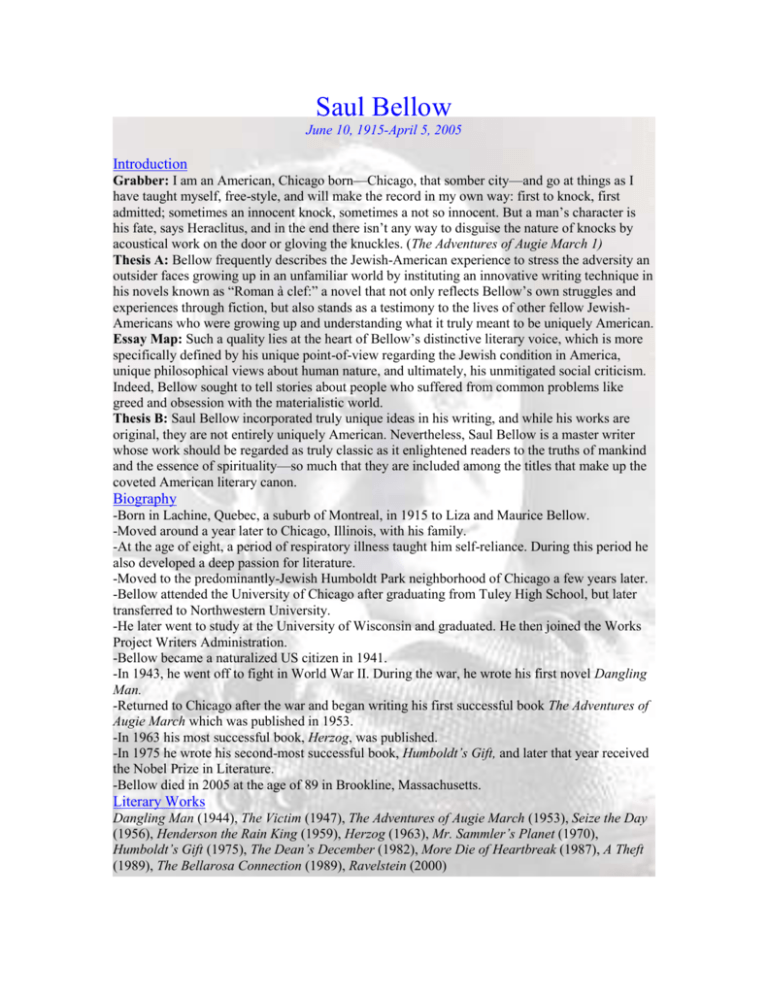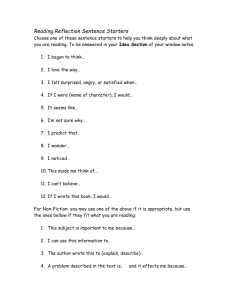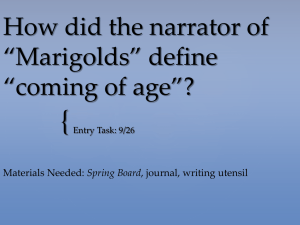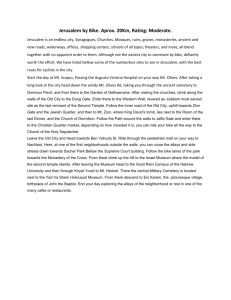Saul Bellow - School District of Clayton
advertisement

Saul Bellow June 10, 1915-April 5, 2005 Introduction Grabber: I am an American, Chicago born—Chicago, that somber city—and go at things as I have taught myself, free-style, and will make the record in my own way: first to knock, first admitted; sometimes an innocent knock, sometimes a not so innocent. But a man’s character is his fate, says Heraclitus, and in the end there isn’t any way to disguise the nature of knocks by acoustical work on the door or gloving the knuckles. (The Adventures of Augie March 1) Thesis A: Bellow frequently describes the Jewish-American experience to stress the adversity an outsider faces growing up in an unfamiliar world by instituting an innovative writing technique in his novels known as “Roman à clef:” a novel that not only reflects Bellow’s own struggles and experiences through fiction, but also stands as a testimony to the lives of other fellow JewishAmericans who were growing up and understanding what it truly meant to be uniquely American. Essay Map: Such a quality lies at the heart of Bellow’s distinctive literary voice, which is more specifically defined by his unique point-of-view regarding the Jewish condition in America, unique philosophical views about human nature, and ultimately, his unmitigated social criticism. Indeed, Bellow sought to tell stories about people who suffered from common problems like greed and obsession with the materialistic world. Thesis B: Saul Bellow incorporated truly unique ideas in his writing, and while his works are original, they are not entirely uniquely American. Nevertheless, Saul Bellow is a master writer whose work should be regarded as truly classic as it enlightened readers to the truths of mankind and the essence of spirituality—so much that they are included among the titles that make up the coveted American literary canon. Biography -Born in Lachine, Quebec, a suburb of Montreal, in 1915 to Liza and Maurice Bellow. -Moved around a year later to Chicago, Illinois, with his family. -At the age of eight, a period of respiratory illness taught him self-reliance. During this period he also developed a deep passion for literature. -Moved to the predominantly-Jewish Humboldt Park neighborhood of Chicago a few years later. -Bellow attended the University of Chicago after graduating from Tuley High School, but later transferred to Northwestern University. -He later went to study at the University of Wisconsin and graduated. He then joined the Works Project Writers Administration. -Bellow became a naturalized US citizen in 1941. -In 1943, he went off to fight in World War II. During the war, he wrote his first novel Dangling Man. -Returned to Chicago after the war and began writing his first successful book The Adventures of Augie March which was published in 1953. -In 1963 his most successful book, Herzog, was published. -In 1975 he wrote his second-most successful book, Humboldt’s Gift, and later that year received the Nobel Prize in Literature. -Bellow died in 2005 at the age of 89 in Brookline, Massachusetts. Literary Works Dangling Man (1944), The Victim (1947), The Adventures of Augie March (1953), Seize the Day (1956), Henderson the Rain King (1959), Herzog (1963), Mr. Sammler’s Planet (1970), Humboldt’s Gift (1975), The Dean’s December (1982), More Die of Heartbreak (1987), A Theft (1989), The Bellarosa Connection (1989), Ravelstein (2000) Distinctive Features of Bellow’s Work I. Roman à clef A. Literary Example: Almost all of Bellow’s novels include a character or main character who is Jewish. He describes his struggles and life experiences through this truly unique form of writing. In Herzog, Bellow writes about a middle-aged Jewish man coping with his own inner-demons and outdated ideals. Such writing gives us a look at the inner psyche of Bellow. B. Critical Quote: “He published two novels in his first years as a writer, both with autobiographical overtones. Dangling Man, in the form of a journal, concerns a young Chicagoan waiting to be drafted into military service. The Victim, a more ambitious work, describes the frustrations of a New Yorker seeking to identify and preserve his own background” (Pollitt 92). II. Unmitigated Social Critic A. Literary Example: In Humboldt’s Gift, Charlie Citrine has lived a life of fame and wealth as an actor. Near the end of the story he comes to the realization that his mentor’s gift was the ability to embrace spirituality and reality, and in doing so Charlie rejects the desire and avarice that corrupts human beings. B. Critical Quote: “Such glimpses give humans their sense of meaning, of goodness, of value. They move people to believe that ‘the good we hang onto so tenaciously …is no illusion.’ They offer refuge from the distractions and impurity of the world—The ‘true impression’ is personal, buried within the individual and expressed only with the language of art. It is a hint, a glimpse, a feeling—Bellow is careful not to claim too much—discovered by the person within the work” (Pollitt 95). III. Unique Philosophy on Human Experience A. Literary Quote: “I know that my suffering, if I may speak of has often been…a more extended form of life, a striving for true wakefulness an antidote to illusion” (Herzog 344). B. Literary Quote: “Moses received the steel pattern through his shoes, like Braille. But he did not receive a message” (Herzog 150). C. Literary Quote: “‘We are not natural beings but supernatural beings’” (Humboldt’s Gift 343). D. Critical Quote: “Thoughtful yet humorous, his work pursues the timely question of what it is to be fully human in an increasingly impersonal and mechanistic world” (Malin 1). E. Critical Quote: “Bellow is bolder than he had been in his previous work, for he openly makes a connection between the force of the universe and a human or spiritual principle” (Opdahl 95). IV. An Enduring Idol in American Literature A. Calvino Quote: “…classics help us understand who we are and where we stand.” B. Books in Harold Bloom’s The Western Canon: Seize The Day (1956), The Adventures of Augie March (1953), Herzog (1963) C. Segment from Bellow’s Nobel Prize Speech: “In the 20th century, theirs is still the main influence, for despite a show of radicalism and innovation our contemporaries are really very conservative. They follow their l9th-Century leaders and hold to the old standard, interpreting history and society much as they were interpreted in the last century. What would writers do today if it would occur to them that literature might once again engage those "central energies", if they were to recognize that an immense desire had arisen for a return from the periphery, for what was simple and true?”






